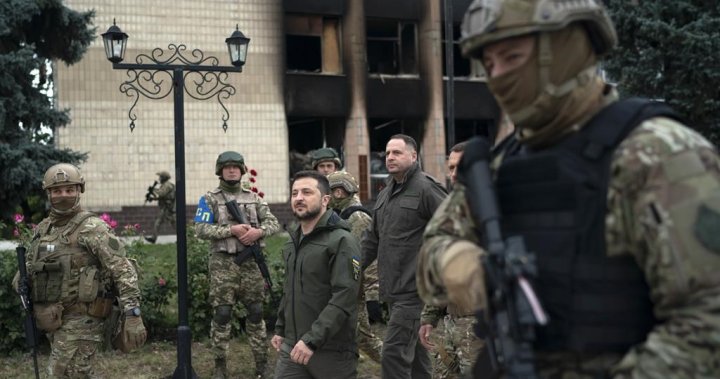
Clock ticking for Ukraine, Russia as winter approaching makes battle more complicated
Global News
Already, rainy weather is bringing muddy conditions that are starting to limit the mobility of tanks and other heavy weaponry, according to the Institute for the Study of War.
The onset of autumnal weather, with rains making fields too muddy for tanks, is beginning to cloud Ukraine‘s efforts to take back more Russian-held territory before winter freezes the battlefields, a Washington-based think tank said Sunday.
Russia, meanwhile, pressed on with its call-up of hundreds of thousands of men to throw into the seven-month war, seeking to reverse its recent losses. Without control of the skies over Ukraine, Russia is also making increasing use of suicide drones, with more strikes reported Sunday in the Black Sea port city of Odesa.
The Russian mobilization — its first such call-up since World War II — is sparking protests in Russia, with fresh demonstrations Sunday. In Dagestan, one of Russia’s poorer regions in the North Caucasus, police fired warning shots to try to disperse more than 100 people who blocked a highway while protesting the call-up, Russian media reported.
It is also opening splits in Europe about whether fighting-age Russian men fleeing in droves should be welcomed or turned away.
For Ukrainian and Russian military planners, the clock is ticking, with the approach of winter expected to make fighting more complicated. Already, rainy weather is bringing muddy conditions that are starting to limit the mobility of tanks and other heavy weaponry, according to the Institute for the Study of War.
But the think tank said Ukrainian forces are still gaining ground in their counteroffensive, launched in late August, that has spectacularly rolled back the Russian occupation across large areas of the northeast and which also prompted Russian President Vladimir Putin’s new drive for reinforcements.
The partial mobilization has triggered an exodus of men seeking to avoid the draft — and sharp differences of opinion in Europe in recent days about how to deal with them.
Lithuania, a European Union member-country that borders Kaliningrad, a Russian Baltic Sea exclave, said it won’t grant them asylum. “Russians should stay and fight. Against Putin,” Foreign Minister Gabrielius Landsbergis tweeted.










